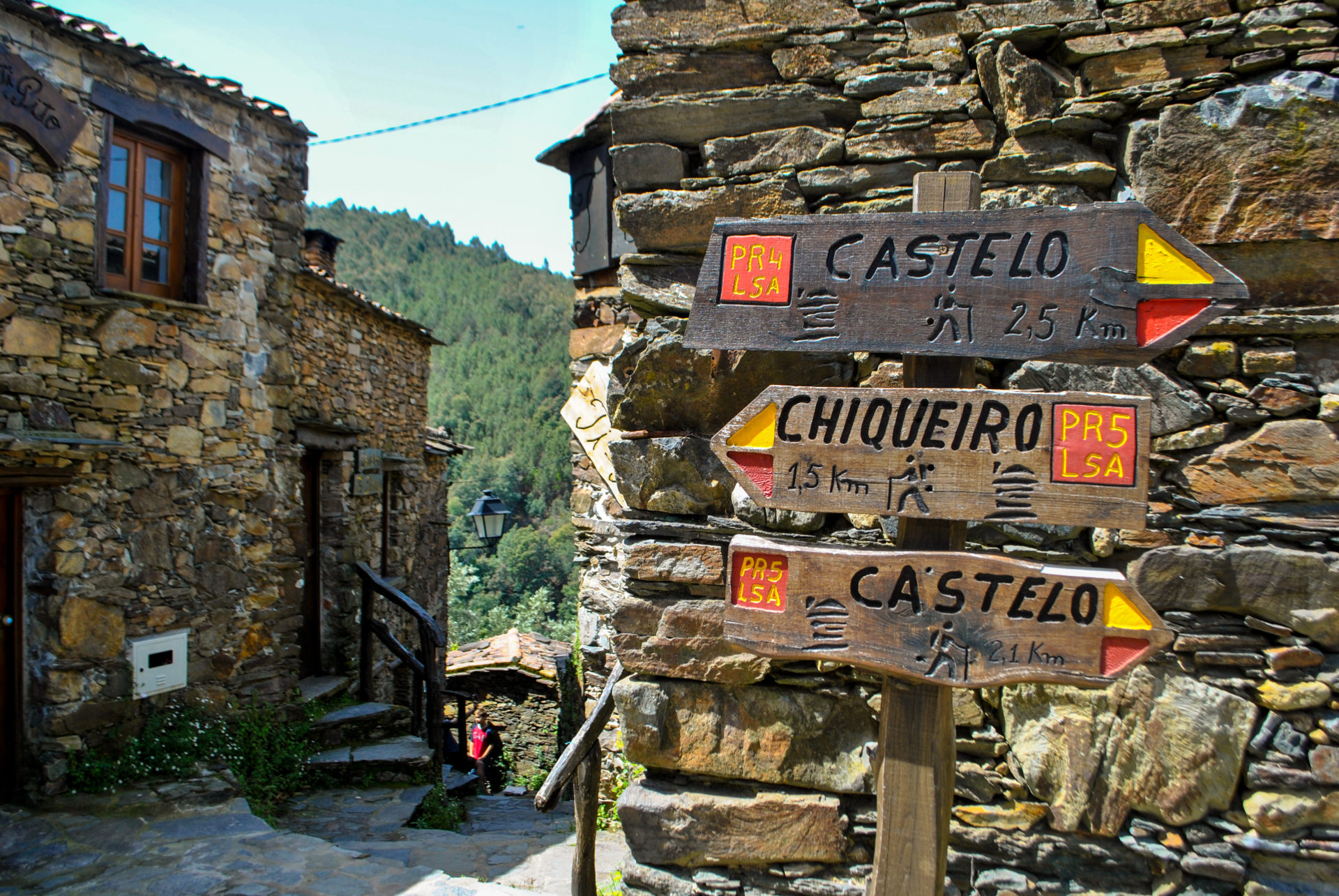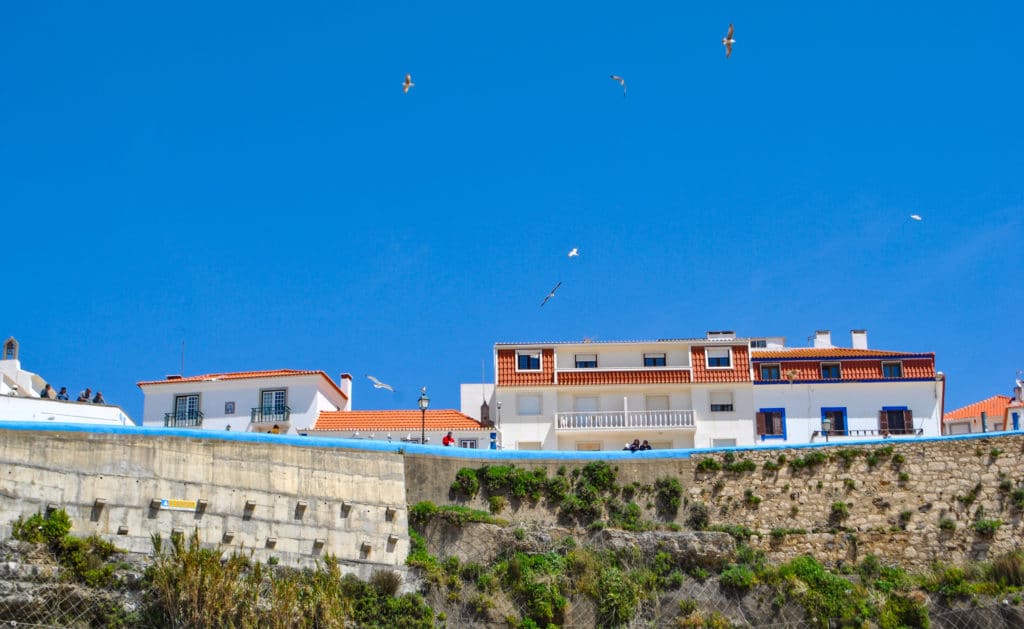Want to explore Portugal off the beaten path? This small schist village in Central Portugal is one of my favorite discoveries in the country. Get ready for a trip back in time.
This page contains affiliate links. If you buy through these links, I may receive a small commission, at no additional cost to you. I only recommend products or services I have tried and/or find useful and reliable.
Towards the end of my two-year stay in Portugal, after having explored most of the main cities and tourist spots, I found out about the existence of these remote schist villages situated in the lush greenery of Central Portugal.

Schist villages, Portugal’s well-kept secret
Schist villages, in Portuguese aldeias de xisto, are these magical places where time seems to have stopped a few centuries ago. These are probably the most characteristic places in Central Portugal. They are immersed in nature and mostly disconnected from the rest of the world. The name comes from the main material used to make the houses, schist stone. This is a metamorphic rock generally formed from mudstone or clay, and it gives the villages an old-timey, rustic feel.

There are 27 schist villages in Central Portugal, between the regions of Serra da Lousã, Serra do Açor, Zêzere, and Tejo-Ocreza.
Hiking to Talasnal, a schist village in Central Portugal
Talasnal is one of the 12 schist villages in Serra da Lousã, surrounded by the luxuriant vegetation of the Lousã mountain range. I chose to visit Talasnal over other villages because it has a better connection with public transportation. The village is actually easily reachable also by car, but this was not an option for me.
So one sunny Sunday morning, I left by bus from Coimbra to the town of Lousã. Although it was only April, the sun was strong and the temperature quickly reached about 27 degrees. The hike to Talasnal starts at Lousã Castle, about 3 kilometers from the city center, but my walk started from the bus station. I made my way, around 45 minutes, to the Castle, already immersed in the greenery of the Lousã mountain range. Unlike other castles in Portugal, this one is quite isolated from the town.

The hike is easy at first, a nice and relaxed stroll in nature. I was enjoying finally being able to breathe pure air and enjoy the lush forest around me. But at some point, you need to really start climbing up narrow paths into the forest. After around one kilometer of this rough terrain in the shadow of the trees, you emerge back into the light to an amazing sight of the Serra de Lousã mountain range, all covered in green as far as the eye can see.
As you keep walking up, a bunch of brown-grey houses appear into sight on top of the hill. They seem to somehow merge with the vegetation partially covering them. You have finally reached Talasnal. This is the biggest schist village in the Serra de Lousã, though it might not look like it.
Discovering the schist village of Talasnal
One thing is for sure, this lovely little schist village will bring you back in time. The narrow streets don’t allow any cars to pass, and there is barely any sign of technology. You will most likely not have any internet connection, so get ready for a digital detox. All around, there are maybe around 40 to 50 small schist houses. Their colorful windows and small terraces overlook a never-ending expanse of bright green trees.

You can walk around tiny little alleys, and in about 15 minutes, you have explored every angle of the village. If you want to head somewhere for lunch after the long and tiring hike, there are quite a few options. Don’t expect a varied menu or anything fancy. Rather, prepare for a hearty, fulfilling meal, enjoying the silence and peace all around you.

I had lunch at a little place called O Retalhinho. They didn’t have a menu, just three dishes that they quickly announced as I entered the place and asked if they served any food. I had a sort of beef stew served with rice, which was incredibly good and fulfilling. It truly tasted like homemade food, and after the long hike, it was just what I needed. I sat on a small terrace with just a few tables. All around me, there was just the chirping of the birds and a light breeze. It felt heavenly to simply be there and enjoy the moment, no distractions, no intrusions. Just nature and some great food.

After lunch, I went for a walk just outside the village. A few spots just a little downhill will reward you with a lovely view of this handful of houses. By the way, another popular name for this place is Talasnal, Montanhas de Amor, meaning Love Mountains. I think the name couldn’t be more appropriate. You will definitely fall in love with this place, its authenticity, and its peaceful atmosphere.

Why Visit Talasnal?
This little trip made me realize how necessary it is to disconnect every once in a while. As a child, apart from the fact that technology wasn’t yet so pervasive, we would go quite often for a day or weekend trips in the mountains. We would hike and camp somewhere in the forest or along a river. There, with family and friends, we would have picnics and enjoy the pure air and nice weather.
Back in Romania, this was quite a common practice. We call this going “to the green grass”. That’s because people would escape the city to go somewhere where there’s greenery and nature. At this point, I hadn’t done this in years, and I realized how much I had missed it.

So if you’re visiting Portugal and are looking for something more than just nice beaches and colorful cities, this might be the place for you. You get to see an authentic, well-preserved piece of Portugal’s history. And although these little villages have been remodeled for tourism purposes and are lately quite publicized, you can still enjoy a chill, peaceful atmosphere, with few crowds, no pressure, and no distractions. Just you, nature, and a bunch of cute little schist houses overlooking the forest.

If you want to learn more about all the schist villages, there is an entire website dedicated to them. You can explore many more such villages around Central Portugal. Unfortunately, some are only reachable by car, but others are a bit more accessible.
To reach Talasnal without a car, you can catch a bus from Coimbra. The ride takes just over one hour, and there are several daily departures. Check Metro Mondego for the schedule and fares.
Also, if you’re looking for other less touristic places to visit in Portugal, check out my article on 10 off-the-beaten-track destinations in Portugal.
Travel Resources
I’ll leave you with my go-to apps and websites for trip planning.
| Website/App | Category | Description | Book Here |
|---|---|---|---|
| Booking.com | Accommodation | My favorite website for great accommodations for different budgets. | Find a Place |
| Kiwi.com | Flights | My new favorite platform for finding affordable flights. | Find Flights |
| Omio | Transportation | You can book everything from buses and trains to ferry rides. | Transportation |
| SafetyWing | Insurance | One of the best travel medical insurances for frequent travelers. | Get Insured |
| Manawa | Activities | A great platform to book activities and adventures with local hosts. | Find Activities |
| GetYourGuide | Activities | My go-to platform for tours and experiences with lots of options. | Experiences |
| Viator | Activities | A great alternative for activities all over the world. | Experiences |
| GuruWalk | Free tours | A great platform for free walking tours (tipping is recommended). | Book a tour |
| DiscoverCars | Car rental | My go-to platform for car rental anywhere in the world. | Rent a Car |
| Airalo | eSIM | My favorite app for buying digital SIM cards when traveling abroad. | Get an eSIM |
| Saily | eSIM | A great alternative to Airalo, with cheaper plans in some destinations. | Get an eSIM |
| Xe | Currency | A currency converter showing real-time rates. Website or app. | Get Xe App |
| Maps.me | Navigation | My favorite navigation app for hiking trails and remote areas. | Get Maps |




